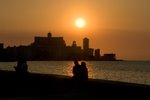Habana 3/23 -- There is new word from the Cuban government about the confused situation following the death of iconic leader Fidel Castro. Allejandro Fernandez, a lower level official at the ministry of the interior has directly phoned a number of local journalists with the following statement: "Alarmed by the threatening statements made by representatives of the United States and its allies, the government of Cuba has taken immediate steps to ensure a smooth transition. All reservists are being asked to report for duty, and the nation's defense forces have been placed on high alert, The revolutionary guard will repel any attempt by outsiders to impose their will upon the free people of Cuba."
But the situation remains puzzling. The voice of the Cuban government, so unified and foreceful in the waning hours of Fidel Castro's illness, now appears to be stammering. Why hasn't the latest statement been broadcast on national radio and television? Why is there no single spokesperson responsible for direct contact with the public? And why has no one yet explained the delay in president-designate Raúl Castro's address to the Cuban people?
Fernandez is known to be a stalwart supporter of the Castro regime. Has he replaced the government's previous official spokesman? Or is a struggle taking place within the leadership, a struggle that is reaching down to mid-levels of bureaucrats and functionaries? And most importantly, is the army still unified behind its long-time chief of staff?
The radio continues to offer patriotic music and Cuban folk songs, but there is less and less activity in the streets. No public transportation is running, and shops are closing early, either for lack of customers or in anticipation of an official curfew.
A few minutes ago, I made my way on foot to the nearby offices of the ministry of labor. The entrance was heavily guarded and no one seemed to be coming or going from the building. But at the nearest corner, where day laborers often gather in hopes of picking up an odd job, a group of 40-50 men had assembled. "We are here to support the president," one of the men told me. "Normally, we carry shovels and picks, but if we must, we will shoulder rifles."
I also made my way to the coffee shop on Avenida Esperanza, which had reopened following the morning's confrontation with security forces. A few students sat in the half-light sipping espresso. They were reluctant to talk with me at first, but seemed to relax when I showed my Spanish passport.
"There are many people who do not want to see Muso (another nickname for Raúl Castro) as president," one of them said. "There are many people meeting today in houses and offices around the island to plot a new course for Cuba, a course that will bring us into the 21st century. It is time; we have waited long enough."
When I asked if there were demonstrations planned, they shrugged noncommittally. Then one of them added with a strange grin, "Students always stay up late at night."
havana hombre
Friday, March 23, 2007
Subscribe to:
Post Comments (Atom)

No comments:
Post a Comment